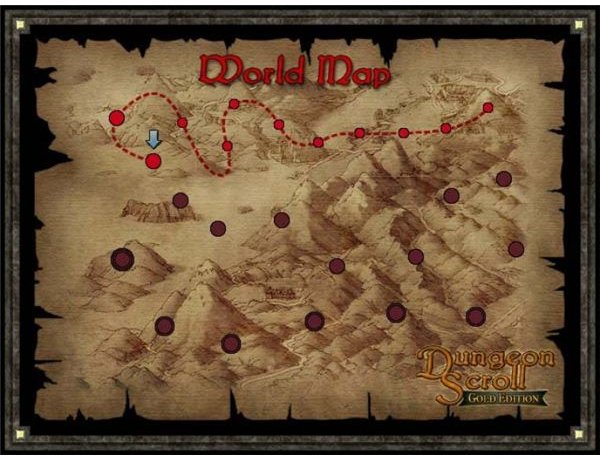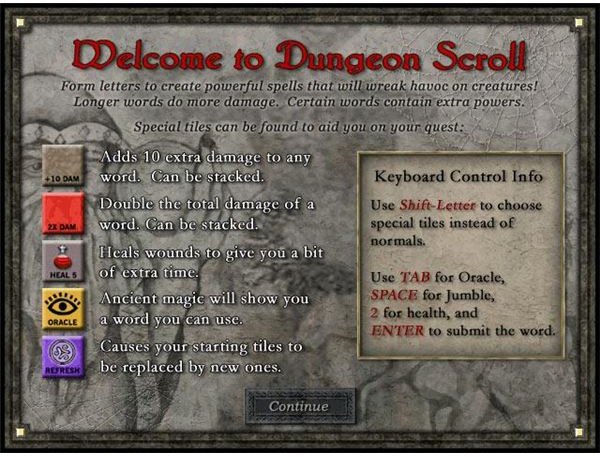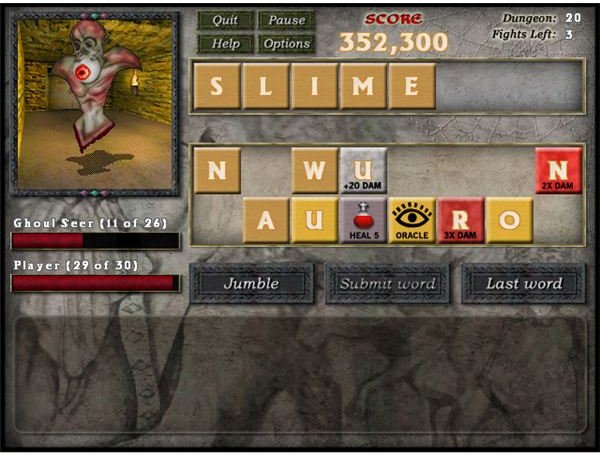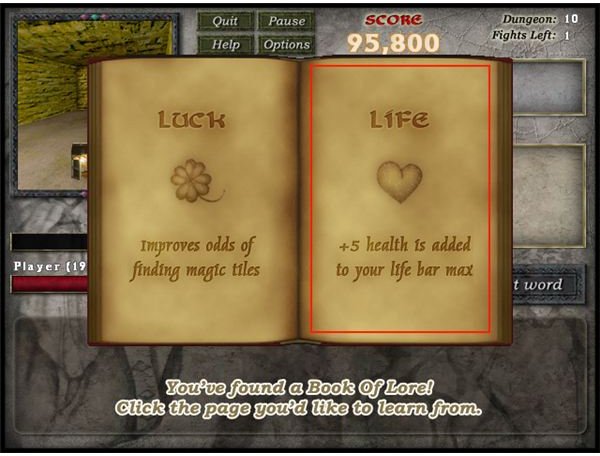RtSoft Dungeon Scroll Gold Edition Review: PC Word Game - Review of Dungeon Scroll by RtSoft

Game Overview
While it’s not a new game, Dungeon Scroll Gold Edition by Robinson Technologies (RtSoft) can still offer up some fun. If you’ve ever played Lexicon (a card game where you make words from lettered cards), or seen the UK TV show ‘Countdown’ (where you make words from a selection of letters) or even played ‘Scrabble’ then you won’t be too surprised to learn that ‘Dungeon Scroll’ is a mixture of the three, while also adding a couple of RPG elements into the mix.
Dungeon Scroll Gold Edition

Gameplay (3 out of 5)
The game itself is extremely easy to setup and players can jump straight into the ‘action’. The object of the game is for the player to traverse 25 dungeons, defeating the enemies found there by making ‘spell’ words from a series of letters. It might sound simple, and to begin with it is. However, it soon becomes apparent that things aren’t quite that easy.
For starters, there are different coloured tiles from which to make your words. Playable words need to be of three or more letters in length, with the longer words dealing more damage to the foes you face. Foes range from rats, whose average strength is only three or four hit points to skeletons (nine to fifteen) and beyond. For the most part the tiles you have at your disposal return to the player to re-use on the next monster. However, some tiles - marked by a different colour - can only be used once. What’s more, these tiles only present themselves once you have defeated a monster, so their occurence in the game can be random.
Other tiles you might come across include tiles which increase your word damage, but again are only useable once and are only found by defeating opponents; healing potion tiles which can be used to claim back some thinking time; and Oracle tiles which can be used to play the best available word from all the available letters. Killing boss monsters yields a Book Of Lore which offers the player a choice of enhancements. These include adding to your health (more time) and adding to your strength (more damage).
Each dungeon contains six ‘battles’, each of which involves the player forming words from the available tiles which score enough ‘damage’ to kill each monster. Most monsters can be dealt damage with words of three letters or more, but some - such as the giant turtle - require words with four or more letters. At the end of the dungeon, players find a randomly generated but useless treasure.
It still sounds relatively simple, but the hardest part of the game is formulating those words. While you might think yourself a bit of a whizz at ‘Scrabble’, in Dungeon Scroll, each word you make can only be used once per dungeon. This makes it a little more difficult, especially if you haven’t been dealt the best selection of letters so watching those three and four-letter words is important for later in the dungeon when you’re running out of words to make.
The battles in each dungeon are randomly generated - there’s no progression from one monster to the next in terms of toughness, so you could fight six easy rats in the dungeon, or you could fight six reasonably difficult snakes, all of which are of a similar difficulty.
Gameplay Screenshots


Difficulty (3 out of 5)
Dungeon Scroll features three playable levels of difficulty:
- Kid Level - the easiest level offers an easier passage through the dungeon. Players begin the game with extra health (time) and spell words inflict double damage on monsters.
- Normal Level - the standard difficulty level, and the game’s default setting.
- Wizard Level - the hardest difficulty setting starts players off in the fourth dungeon.
Graphics & Sound (4 out of 5)
As you might expect, neither the graphics or sound are anything stellar but do fit the game well. The map screen charts the player’s progress through the dungeons, while the opponent window give a simple representation of the enemy you must defeat. When you play your ‘spellword’ the damage each one does is represented on the opponent window, while the health bar shows you how much strength your opponent has, and how much health (time) you have left. When a monster is defeated it disappears in a nicely rendered explosion.
The sound is appropriately used and unlike some other downloadable games doesn’t become irritating after a while. The background music, when it occurs, fits the current scenario, while the majority of sounds you hear will simply be the movement of your game tiles.
Game Controls (5 out of 5)
Nothing fancy here, the game is supremely easy to control as it’s all done by the mouse. Simply hover and left-click on the letters to add or remove them from your word, or to submit your word or reshuffle the tiles you have in the hope of spotting a previously unplayed word.
Overall (3 out of 5)
Where the game falls down is through it’s long-term playability. After a few dungeons, the game began to get a little monotonous; perhaps through the apparent selection of available monsters you could combat. Beating simple rats with words like ’now’ or ‘one’ becomes less fun the further through the dungeon you progress, as you would expect the levels of opponent to scale appropriately towards the higher levels as you go and thus increasing the challenge. That said, there are the occasional hard-as-nails opponent encounter, such as with dragons, but they’re few and far between leaving the overall game feel a little unbalanced.
A time-locked demo version of Dungeon Scroll is available to try out, while the full version of the game is available at $14.95
Dungeon Scroll Gold Edition is a decent time-filler for adults, although schoolkids might have more fun from the game as they battle monsters while improving both their spelling and vocabulary skills.
